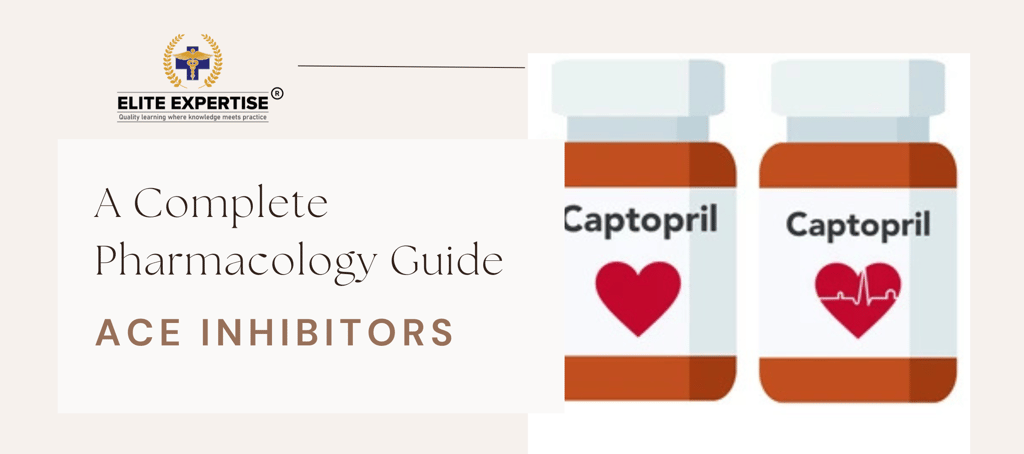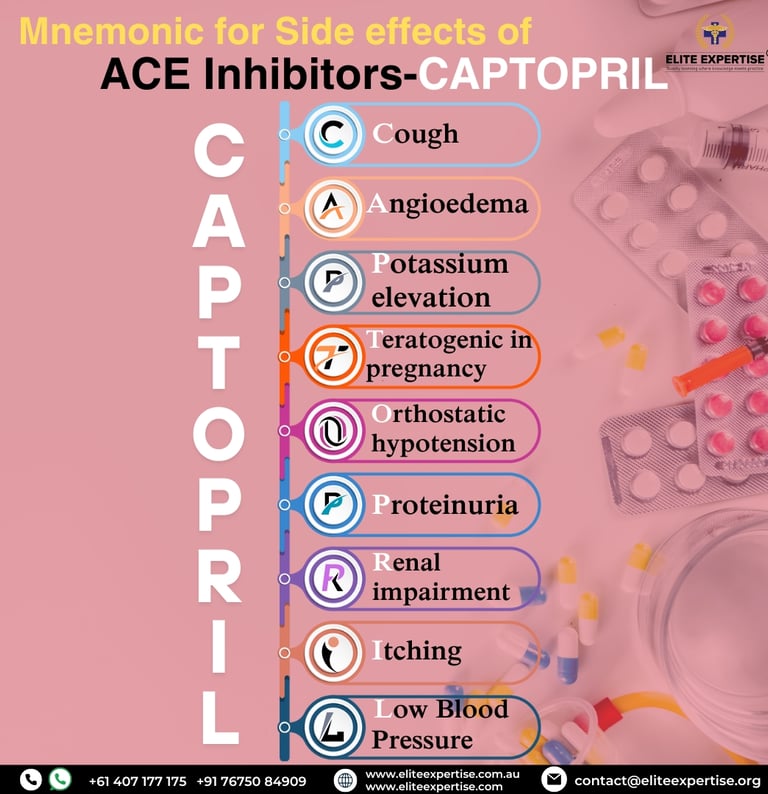ASK MY PHARMACIST | GOT QUESTIONS? Your pharmacist has answers. Click Here
ACE Inhibitors (Angiotensin-Converting Enzyme Inhibitors): A Complete Pharmacology Guide for Pharmacy Exams
Master ACE Inhibitors with this complete pharmacology guide for pharmacy exams. Learn their mechanism, uses, side effects, mnemonics, and top study tips for OPRA
Krupa
6/28/20253 min read


What are ACE Inhibitors?
ACE inhibitors are a group of medications that are primarily used to treat hypertension (Blood pressure) and heart failure. They work by relaxing blood vessels, which reduces the workload on the heart. ACE inhibitors act on Renin-Angiotensin-Aldosterone-System (RAAS) to lower the blood pressure and reduce the strain on kidney and heart.
They are mainly used to treat conditions like:
Hypertension
Heart failure
Chronic kidney disease(CKD)
Post-Myocardial Infarction (MI)
Diabetic nephropathy
These widely prescribed and frequently tested in pharmacy licensing exams such as OPRA (Australia), PEBC (Canada), PSI (Ireland), FPGEE (USA), etc
What is the mechanism of action of ACE inhibitors?
ACE Inhibitors block the action of the ACE (Angiotensin Converting Enzyme which is involved in the production of Angiotensin II, which is a potent vasoconstrictor.
By inhibiting the action of this enzyme:
ACE Inhibitors reduces production of Angiotensin II leading to less vasoconstriction
It decreases the production of Aldosterone, thus causes lower sodium and water retention in body
It will increase bradykinin which will increase the vasodilation. (But causes dry cough)
Net result of these actions are :
Lower blood pressure
Improved cardiac output due to reduced preload and afterload
Reduced renal damage in diabetics
Decreased preload and afterload in heart failure
Common ACE Inhibitors: At a Glance
Most ACE Inhibitors end in “PRIL”. Captopril is notable for its sublingual use in hypertensive emergencies
What are the common uses of ACE Inhibitors?
What are the common side effects of ACE Inhibitors?
Dry cough: This is most common, affecting the majority of patients due to bradykinin buildup due to the mechanism of action. The cough can be persistent and may be more noticeable at night or when lying down.
Dizziness and Lightheadedness: mainly occurs when the therapy is started or the dose is increased. And may be more pronounced when standing up quickly.
Headache: commonly seen
Fatigue and weakness: some patients can feel tiredness
Taste disturbance: a metallic taste or loss of appetite
Gastrointestinal issue: Nause, stomach upset, diarrhea, or constipation may occur
Less common side effects are:
Angioedema
Kidney problems
Hyperkalemia
First-dose hypotension
Mnemonic for Side effects of ACE Inhibitors-CAPTOPRIL


Common Drug interactions with ACE Inhibitors
What are the study tips for ACE Inhibitors (for pharmacy exams)
Use Mnemonics for understanding and remembering
Prepare Flashcard: Create “drug-side effect-use”flashcard
Practice Case study scenarios
Prepare visual flowcharts for better understanding
How Elite Expertise Can Help you ace these difficult topics and exams. At, Elite expertise, we guide pharmacy professional worldwide to pass tough exams like:
OPRA (Australia)
PEBC (Canada)
PSi (Ireland)
Final take away:
ACE Inhibitors are more than just blood pressure medication. They protect the heart, preserve kidney function, and improve survival after MI or in heart failure. Whether you are preparing for competitive exams or using the knowledge in Clinical practice, understanding the mechanism, side effects, and clinical significance is essential.
This blog is intended for educational and informational purposes only. While every effort has been made to ensure accuracy, the information provided does not constitute medical or professional advice. Pharmacy-related content, drug names, uses, and recommendations should always be verified with official guidelines, textbooks, or qualified healthcare professionals. Readers are advised to consult regulatory authorities such as the Pharmacy Board of Australia, PEBC (Canada), or PSI (Ireland) for updated exam and licensing details. Elite Expertise does not provide medical advice but offers academic guidance to pharmacy professionals worldwide.
⚠️ Disclaimer


About the Author
Krupa Karamchand
Content Writer | Elite Expertise
Krupa Karamchand is a B. Pharm graduate and KAPS-qualified pharmacist with over 7 years of experience in the pharmaceutical field. As an experienced SEO content writer, she combines her in-depth healthcare knowledge with proven digital strategies to create informative, engaging, and search engine–optimized blogs. Krupa is passionate about making complex medical topics easy to understand and accessible to all readers.
Follow On
Follow Us
+91 76750 84909
Privacy Policy | © 2025 Elite Expertise . All Rights Reserved.
ELITE EXPERTISE PTY. LTD (ABN: 15668292439) (ACN: 668292439)
Australian Statutory Education License: OPP 2025 ELITE EXPERTISE PTY. LTD
Disclaimer
Elite Expertise is an online education platform dedicated solely to providing coaching and preparation services for the OPRA, PEBC, PSI and PTE exams. We do not offer any sponsorship or migration services. All information provided on our platform is for educational purposes only and should not be interpreted as legal or immigration advice. For inquiries regarding sponsorship, visa applications, or migration services, please consult with licensed immigration professionals or relevant authorities.
Elite Expertise is a trusted and results-driven training platform specializing in preparation for international pharmacist licensing exams. Our comprehensive courses, expert instructors, and proven methodologies have helped countless pharmacy professionals achieve their goals and succeed in competitive regulatory exams. We are proud of our strong success rate and commitment to excellence.
Elite Expertise is an independent training provider. We are not affiliated with any global pharmacy regulatory authorities or official exam-conducting bodies.
Copyright © 2026 Elite Expertise. All rights reserved.
Address
Unit 1/73 Beverley St, Doncaster East VIC 3109, Australia
